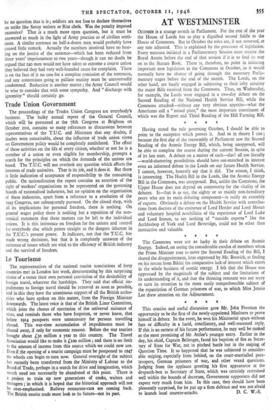Trade Union Government
The proceedings of the Trades Union Congress are everybody's business. The bulky annual report of the General Council, which will be presented at the 78th Congress at Brighton on October zrst, contains so many references to discussions between representatives of the T.U.C. and Ministers that any doubts, if doubts were conceivable, about the influence of trade union views on Government policy would be completely annihilated. The effect of these activities on the life of every citizen, whether or not he is a member of a union or even eligible for membership, prompts a search for the principles on which the demands of the unions are based. The T.U.C. will not overlook any question which affects the interests of trade unionists. That is its job, and it does it. But there is little indication of acceptance of responsibility to the consuming public. On nationalisation the report contains an assertion of the right of workers' organisations to be represented on the governing boards of nationalised industries, but no opinion on the organisation of these industries, apart from a reference to a resolution of the 5945 Congress, not subsequently pursued. On the closed shop, with all its implications for personal freedom, there is nothing. On general wages policy there is nothing but a repetition of the non- sensical statement that these matters can be left to the individual unions. It is this insistence on freedom for the unions and control for everybody else which points straight to the dangers inherent in the T.U.C.'s present power. It indicates, not that the T.U.C. has made wrong decisions, but that it is completely unaware of the existence of issues which are vital to the efficiency of British industry and the survival of freedom.






























 Previous page
Previous page